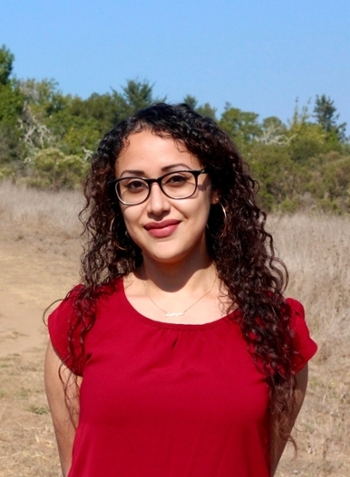Many campus members are advancing research on preventing, responding to, and addressing gender-based violence, harassment, and discrimination.
This month we are spotlighting:
Brenda C. Gutierrez
Linking Sexism and Violence Against Women
About Brenda:
I am a 5th year Ph.D. candidate in the Psychology department at UCSC focusing on Developmental Psychology. I am a first-generation college- and graduate-student from Los Angeles. My research aims to understand the development of sexism within cultural communities from an intersectional feminist perspective, and to work towards addressing the consequences of sexist beliefs. It is important for me to conduct this work from a lens that promotes positive cultural engagement and identity development.
My commitment to working towards gender equity led me to my role as a Title IX graduate student intern working in support of prevention efforts. My commitment to equity has also informed my passion about teaching. My goal as an instructor is to create an equitable, inclusive, and engaging class and research space for all students. I have developed my pedagogy from hands-on-experience as a TA and GSI for the Psychology department and from participating in pedagogy certificate programs for UCSC’s CITL (i.e., Pedagogical Leadership, Teaching for Equity, Teaching Writing as a Discipline, Graduate Course Design & Delivery). I have also grown as an instructor through my roles as a CITL Graduate Pedagogy Fellow and Peer Support Team Member and as an undergraduate MINT mentor and undergraduate research mentor.
About Brenda’s research project, Linking Sexism and Violence Against Women:
Much of my research considers ambivalent sexist attitudes. Ambivalent sexism encompasses two separate, yet complementary attitudes, that reflect how sexism can be conceptualized in society. Hostile sexism refers to the outward misogyny and dislike of women that people most often think of when referring to sexism. Benevolent sexism, however, is a more subtle yet still harmful form of sexism that often appears positive – but are actually patronizing towards women. Benevolent sexism refers to beliefs that women are an inherently special gender that deserve protection and delicate care – in exchange for lower societal status. Hostile and benevolent sexism work together to maintain gender inequality.
Our work has highlighted the harsh impacts of holding both hostile and benevolent sexism beliefs. My advisor, Campbell Leaper, and I conducted a recent meta-analytic review of previous studies testing the links between ambivalent sexism and violence against women (VAW). We focused on attitudes that support violence against women, such as cultural myths about violence that focus on victims (e.g., victim blame), or perpetrators (e.g., exonerating perpetrators of blame), or incidents of violence (e.g., minimizing the severity) across forms of violence (partner violence, sexual violence and sexual harassment). We also focused on men’s self-reported prior perpetration of VAW and their self-reported likelihood to engage in violence.
From this large review, we found that holding more hostile and benevolent sexist beliefs was linked to attitude that justify violence against women (VAW), especially those that blamed or were generally negative towards victims (e.g., not believing victims). Interestingly, even though benevolent sexism often appears to hold positive views towards women, holding benevolent sexist beliefs was more strongly linked to justifying VAW among women more so than among men. This highlights the reality of benevolent sexism as an insidious form of sexism that maintains a culture of violence against women. Finally, we found that holding both hostile and benevolent sexism was linked to men’s more frequent previous perpetration and likelihood of future perpetration.
Altogether, our work demonstrates the importance of addressing common societal beliefs, especially those that may not always appear as outwardly harmful (such as benevolent sexism) to work towards alleviating gender-based violence.
To learn more about Brenda's research, contact: brcgutie@ucsc.edu
Learn more about the research happening on the UC Santa Cruz campus via our monthly spotlights (see previous spotlights here).


